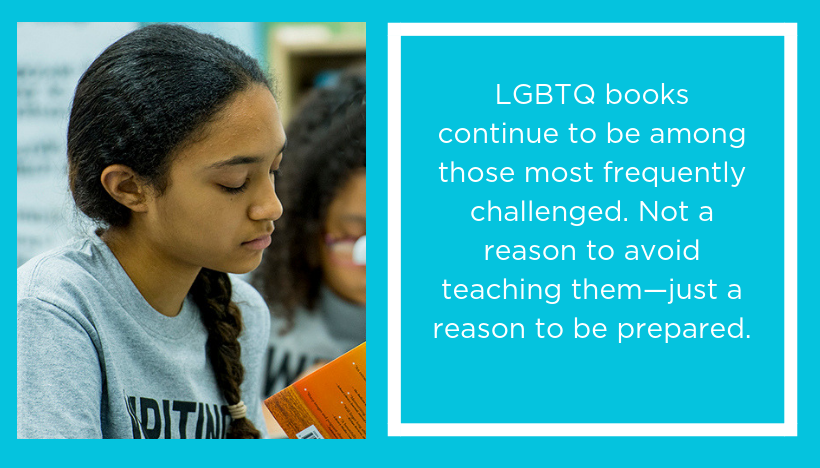There’s a great article in the March Council Chronicle, “Teachers as Change Agents: Piloting an LGBTQ Book Club for Middle-Grade Students.” Because I spend a good deal of time defending books, I confess that I began to worry even before I began to read. You see, LGBTQ books continue to be among those most frequently challenged. Not a reason to avoid teaching them; just a reason to be prepared.
Teacher educator Emily Meixner and teacher Rachel Scupp took an important step before they began the unit. They secured buy-in from the school’s administrators to incorporate an LGBTQ unit into teacher Rachel Scupp’s human rights IRLA (Integrated Reading/Language Arts) curriculum. Emily Meixner writes in a Nerdy Book Club Blog,
After speaking with Rachel’s enthusiastic supervisor and getting permission from her equally supportive superintendent and school board, we decided to schedule the LGBTQ Book Club unit we had designed in October.
Also, the unit had buy-in from the students who added their reasons for believing in the books in the same blog.
We believe these books… [Note that all the reasons are annotated in the blog.]
(1) Educate us and help us become more accepting, which is the building block for equal representation and friendships.
(2) Teach us about these topics in a good context so that we get the whole truth.
(3) Inform us about the past so we can understand how our society works now as well as how to avoid making mistakes in the future by being conscious of our words and actions.
(4) Teach us to be strong in the future by being accepting and understanding.
(5) Create a safe space for LGBTQ members in society and in schools.
We must learn to respect LGBTQ people by using proper terminologies in order to give them a sense of belonging. We must abide by others’ right to express themselves by not generalizing the infinitely many experiences to merely a few broad generalities. We also got the chance to create an LGBTQ advocacy project which led to the creation of the GSA, our first Gay-Straight Alliance at Grover Middle School.
(6) Make us conscious of how LGBTQ kids are represented in books.
These books gave us more perspectives and insight into the lives of LGBTQ kids. We learned about the daily struggle of certain LGBTQ students and how we can overcome the struggles as a community, together. Through books we can learn the truth–that everyone is equal no matter who they love, or what they look like. The way we can learn about acceptance is by reading LGBTQ+ and social justice books. These books can teach us to build friendships with anyone and will allow us to become more accepting. Through these books, we can see equal representation of all people and we can spread equality, which could ripple throughout many generations.
(7) Prevent us from making mistakes in the future in order to bring change, become stronger, and be more mature.
Our maturity levels depend on who we are, what we do, and what we become in the future. Our acceptance is based on what we do in our school and in our childhood, so shouldn’t we change it for the better? Because we are the future and we need to change. Most people say that you should always learn from your mistakes, and that’s what we, as a society, have to accomplish.
When educated on these topics, we learn to accept others and become more mature.
“For teachers who want to take up an LGBTQ curriculum, or similar social justice issues in the classroom,” Scupp shares in The Council Chronicle, “the biggest challenge is developing a list of critical lenses and finding the right texts. Recognize that it’s not reinventing curriculum, it’s just shifting the focus. I’m still targeting all of the standards my students need to reach. The texts they’re using just have a lot richer content and open rich conversations along with developing their skills in English.”
Meixner says her takeaway from developing the unit was: “Trust the students.”
Resources:
NCTE Guideline, Diverse Gender Expression and Gender Non-Conformity Curriculum in English Grades 7–12, developed by the members of the Gender and Literacy Assembly of NCTE (formerly known as the Women in Literacy and Life Assembly [WILLA] of NCTE).
NCAC resource: Defend LGBTQ Stories: A Resource. Take particular note of these three of the “5 Ways You Can Defend LGBTQ Books:”
1. TALK LIKE AN ALLY, WALK LIKE AN ALLY. The most effective way to change attitudes towards LGBTQ books is to destigmatize LGBTQ experiences through our everyday speech and actions, talking openly and kindly about LGBTQ issues and demonstrating inclusivity. Start a conversation on social media and share your views on the educational importance of LGBTQ stories. . . .
2. PROTEST AND PETITION. Real change requires action! Write directly to school or library officials to defend the value of challenged books. Start an online petition to return any books that have been removed or restricted because of their viewpoint. Attend school board meetings where book challenges are discussed and invite others to join you with signs that advocate for freedom of expression. Talk to any reporters who may be present. Write a letter to the editor of your local paper.
3. LOOK UP AND STRENGTHEN YOUR SCHOOL POLICIES. Does your school district protect LGBTQ expression? Check your district or school board’s website for formal procedures on the selection and review of controversial materials. The best policies prevent officials from removing or restricting content without committee review of its educational merits. A book should never be restricted simply because someone dislikes it or considers it “inappropriate.”

